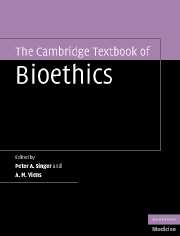Book contents
- Frontmatter
- Contents
- List of contributors
- Acknowledgements
- 1 Introduction
- Section I Information problems
- Section II End of life care
- Section III Pregnant women and children
- Section IV Genetics and biotechnology
- Section V Research ethics
- Section VI Health systems and institutions
- Section VII Using clinical ethics to make an impact in healthcare
- Section VIII Global health ethics
- Section IX Religious and cultural perspectives in bioethics
- Introduction
- 47 Aboriginal bioethics
- 48 Buddhist bioethics
- 49 Chinese bioethics
- 50 Hindu and Sikh bioethics
- 51 Islamic bioethics
- 52 Jehovah's Witness bioethics
- 53 Jewish bioethics
- 54 Protestant bioethics
- 55 Roman Catholic bioethics
- Section X Specialty bioethics
- Index
- References
54 - Protestant bioethics
Published online by Cambridge University Press: 30 October 2009
- Frontmatter
- Contents
- List of contributors
- Acknowledgements
- 1 Introduction
- Section I Information problems
- Section II End of life care
- Section III Pregnant women and children
- Section IV Genetics and biotechnology
- Section V Research ethics
- Section VI Health systems and institutions
- Section VII Using clinical ethics to make an impact in healthcare
- Section VIII Global health ethics
- Section IX Religious and cultural perspectives in bioethics
- Introduction
- 47 Aboriginal bioethics
- 48 Buddhist bioethics
- 49 Chinese bioethics
- 50 Hindu and Sikh bioethics
- 51 Islamic bioethics
- 52 Jehovah's Witness bioethics
- 53 Jewish bioethics
- 54 Protestant bioethics
- 55 Roman Catholic bioethics
- Section X Specialty bioethics
- Index
- References
Summary
Mr. H is 82 years old and has many serious medical problems, including ischemic heart disease, hypertension, and diabetes mellitus. He has had a series of debilitating strokes that have left him severely disabled and unable to communicate his wishes. His healthcare providers feel that he would not benefit from resuscitation attempts if he were to suffer a cardiac arrest and suggest to his family that a do-not-resuscitate (DNR) order be placed on his chart. The devoutly Baptist family are quite upset and reject this suggestion. They believe that God could still heal their husband and father, and they accuse the healthcare providers of trying to “play God.”
What is Protestant bioethics?
Origins of Protestantism
“Protestant” is a term applied to many different Christian denominations, with a wide range of beliefs, who trace their common origin to the Reformation of the sixteenth century. Protestant ideas have profoundly influenced modern bioethics, and most Protestants would see mainstream bioethics as compatible with their personal beliefs. This makes it difficult to define a uniquely Protestant approach to bioethics.
When Martin Luther first challenged the teachings of the Christian church in the early sixteenth century, few could have predicted the tumultuous consequences. The Reformation was founded on the idea that salvation could not be earned through human effort or bought through indulgences, concepts that were prevalent in the church at the time.
- Type
- Chapter
- Information
- The Cambridge Textbook of Bioethics , pp. 430 - 435Publisher: Cambridge University PressPrint publication year: 2008
References
- 1
- Cited by

